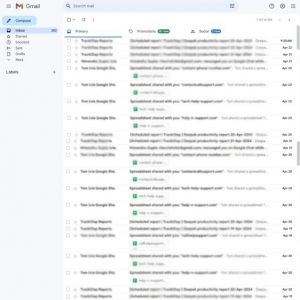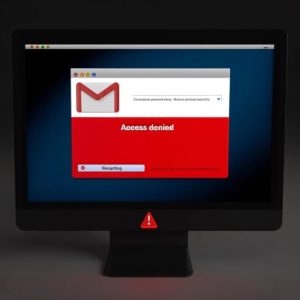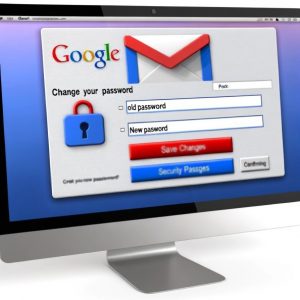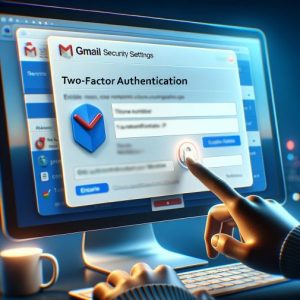Gmail Account Hacked
In today’s digital age, the security of our online communications is paramount. Email, in particular, serves as the backbone for personal and professional interactions, making it a prime target for cyber threats. Among the various email platforms, Gmail is one of the most widely used, boasting over a billion users worldwide. This popularity, unfortunately, makes it a frequent target for cyberattacks. The issue of a Gmail account hacked scenario is not just a possibility; it’s a prevalent problem that affects countless individuals and businesses daily.
Understanding the implications of a hack in Gmail is critical. When your Gmail gets compromised, it can lead to unauthorized access to all your personal information, sensitive data related to work, and more. A Gmail account hacked can mean that personal data has been exposed to cybercriminals who might use it for various malicious purposes, ranging from financial theft to identity fraud.
Moreover, once your Gmail address hacked, the attackers can potentially gain access to various other services linked to your Gmail account, such as cloud storage, shopping sites, and even financial accounts. This can result in a cascading effect, where one breach leads to several more across your digital life.
In light of these risks, it’s evident that securing our Gmail accounts isn’t just a recommendation; it’s a necessity. As we continue to entrust more of our personal and professional lives to digital platforms, the need to protect our email communications becomes increasingly urgent. Recognizing the signs of a Gmail got hacked and knowing how to respond swiftly can minimize the damage and restore security to our digital identities.
When we delve deeper into this topic, we’ll explore the signs of compromised Gmail accounts, the immediate steps to take if you find your account has been hacked, and preventative measures to ensure your account stays secure. This introduction sets the stage for a deeper understanding of importance of email security and the prevalent threat of Gmail account hacking.
Understanding Gmail Account Hacking
When we say a Gmail account hacked, it typically means that unauthorized individuals have gained access to your account. This access allows hackers to read your emails, send messages on your behalf, steal personal information, and potentially lock you out of your own account. Understanding what it means to have your Gmail hacked is crucial to recognizing the risks and consequences associated with such security breaches.
One of the most common methods through which a hack in Gmail occurs is phishing. Phishing attacks involve use of fraudulent emails that mimic legitimate messages from trustworthy sources, like Google. These e-mails often contain links that lead to fake login pages designed to steal your information. Once you input your information, it goes straight to the cybercriminals, granting them full access to your account.
Another prevalent technique is the use of malware. Malware can be installed on your computer or mobile device without your knowledge, often through deceptive links or compromised applications. Once installed, it can log keystrokes, capture passwords directly as you type them, and transmit this information back to the hacker. This type of Gmail account hacked scenario is particularly dangerous because it can bypass even relatively strong passwords.
Password breaches are another significant risk. These occur when large databases of user credentials are stolen from less secure sites and then tested on other platforms, including Gmail. Since many people reuse their passwords across multiple sites, a single breach can lead to multiple accounts being compromised. If your Gmail address hacked through a password breach, it highlights the need for unique passwords for each online service you use.
Moreover, attackers sometimes hack someone’s Gmail by exploiting security questions or through social engineering techniques that trick users into revealing their passwords. In these cases, the attackers gather personal information from various sources until they have enough data to guess or reset a password successfully.
Finally, recognizing that your Gmail got hacked is the first step towards recovery. Understanding these hacking techniques also underscores the importance of proactive measures like using strong, unique passwords, enabling two-factor authentication, and being cautious about the links and attachments you open—even if they seem to come from trusted sources.
Signs Your Gmail Account Got Hacked
Recognizing the signs of a hacked Gmail account is the first critical step in safeguarding your information and preventing further damage. If you think your Gmail account has been hacked, being alert to the common indicators of unauthorized access is essential. Here are the most telling signs that should prompt immediate action:
-
Unusual Activity in Your Account:
One of the most apparent signs that your Gmail account has been hacked is unusual activity within your email account. This can include unknown emails being sent from your account or receiving replies to messages you did not send. Another red flag is emails that have been marked as read or deleted without your knowledge. These activities often suggest that someone else is controlling your email interactions.

-
Alerts from Google About Suspicious Activity:
Google has mechanisms in place to detect when something out of the ordinary occurs with your account. If there is a alert that your Gmail account has been hacked, it typically means that Google has detected suspicious login attempts or access from unfamiliar locations. These alerts are designed to inform you of potential breaches and prompt you to take action, such as changing your password or reviewing recent account activity.
-
Changes in Account Settings That You Didn’t Make:
If your Gmail settings have been changed without your consent—such as a new forwarding address being set up, changes to your linked phone number, or altered recovery options—this is a strong indication of compromise. Hackers may modify these settings to maintain access to your account or to use your account to reset passwords on other services linked to your email.
It’s also essential to watch for less obvious signs such as slower-than-usual performance, which could indicate that your account is being used to send out mass emails (spam). Additionally, if friends or colleagues report receiving strange messages from your address that you did not send, it is highly likely that your Gmail got hacked.
Lastly, unexpected password reset emails from other services could indicate that someone attempting to access other accounts associated with your Gmail address. If you receive such notifications without requesting them, it is prudent to check whether your Gmail account has been hacked and take immediate steps to secure all your accounts.
Immediate Steps to Take if Your Gmail got Hacked
Discovering that your Gmail has been hacked can be quite distressing. However, taking immediate and decisive steps can help mitigate the damage and secure your account. Here’s a clear guide on the essential actions to take if you suspect that your email hacked Gmail:
-
Change Your Password Immediately:
As soon as you realize your Gmail got hacked, change your password. Ensure that the new password is strong, unique, and different from any previously used passwords. It should be a combination of letters, numbers, and special characters. This is a crucial step to regain control, especially if the hackers changed your Gmail password without your consent.

-
Update Account Recovery Information:
Next, verify and update your account recovery details. This includes your recovery email, phone number, and any security questions. It’s vital to update these to prevent hackers from using the hack in Gmail to lock you out of your account permanently.
-
Inspect Account Activities:
Review your recent account activity for any unauthorized actions. This may include emails sent, changes to settings, or other suspicious activities. Google’s “Account Activity” feature can be particularly useful as it displays the geographical locations of where your account has been accessed, which can help identify any hack someone’s Gmail attempt.
-
Secure Linked Accounts:
Since your Gmail address hacked is often linked as a recovery option for other services, ensure that these accounts are also secure. Update passwords and security settings on these linked accounts as well.
-
Notify Your Contacts:
If your Gmail got hacked and was used to send out spam or malicious emails, inform your contacts. Advise them to disregard any suspicious messages that may have been sent from your account.
By promptly taking these actions, you can help control the situation and prevent further unauthorized activities. Acting quickly is crucial to minimizing the damage from a Gmail account hacked situation. These measures also aid in protecting your broader digital life from potential breaches through your email account.
Securing Your Gmail Account Post-Hack
After addressing the immediate aftermath of a Gmail account hacked incident, it’s crucial to fortify your account to prevent future breaches. Enhancing the security of your Gmail account involves several strategic actions that can provide long-term protection. Here’s how to secure your Gmail account effectively:
-
Set Up Two-Factor Authentication (2FA)
2-factor authentication adds a critical layer of security beyond just your password. Even if someone manages to discover your password, 2FA requires them to also have access to a second factor—typically your phone—to log in. To set up 2FA for Gmail:
-
- Go to your Google Account settings.
- Click on “Security” and find the “Two-step verification” settings.

- Follow prompts to add your phone number or a trusted device. This step is especially vital if your Gmail hacked experience showed how vulnerable a password-only approach can be.
-
Review and Secure Account Recovery Options:
Make sure your account recovery options are up-to-date and secure. This includes your recovery phone number and email address. Ensure these are accounts and numbers that are secure and accessible only to you. Adjusting these can be critical if you suspect your Gmail address hacked or if recovery info has been altered by a hacker.
-
Regular Password Updates and Best Practices:
Change your passwords regularly and ensure each password is strong and unique. Use combination of letters, numbers, and symbols, and avoid common words or phrases. Implementing a password manager can help manage and store your passwords securely, reducing the risk of forgetting them or using overly simple passwords. Regular updates are a cornerstone in the effort to recover hacked Gmail accounts effectively and maintain account integrity over time.
-
Monitor Account Activity:
Keep monitoring the activity within your Gmail account. Google provides tools to review devices that have accessed your account and locations where your account was logged in. Regularly check this to ensure all activity is legitimate. This is an essential ongoing practice if you’ve had to recover hacked Gmail accounts situations before, as it can alert you to potential breaches early.
By following these procedures, you can significantly improve security of your Gmail account, making it more resistant to future attacks and breaches. After experiencing a Gmail account hacked scenario, these actions are not just reactive but proactive measures to safeguard your digital life.
What to Do if You Can’t Recover Hacked Gmail Accounts
Dealing with a Gmail account hacked situation can be stressful, especially if initial recovery attempts fail. If you find yourself unable to recover your Gmail account through the usual channels, there are specific steps you can take to either regain access or mitigate the impact of the loss.
-
Using Google’s Account Recovery Process
Start with the official Google account recovery process, which is designed to help you recover a hacked Gmail account. This process involves:
-
- Visiting the account recovery page.

- Entering your email address and following the prompts to submit any information that can help Google verify your identity.
- Answering questions about your account usage, such as last remembered passwords, when the account was created, and any recent emails you remember sending.
- Visiting the account recovery page.
It’s important to provide as much accurate information as possible to maximize your chances of recovering your account. This process can be crucial in cases where your Gmail address hacked has led to a loss of access. If your account still hasn’t been recovered, you can read our detailed blog on Gmail account recovery.
-
Alternatives if the Account Cannot Be Recovered
If all attempts to recover your hacked Gmail account fail, consider these alternatives:
-
-
Set Up a New Gmail Account:
While not ideal, creating a new Gmail account may be your best option. Ensure that you secure this new account with strong password and two-factor authentication to avoid similar issues.
-
Notify Your Contacts:
Let them know about the hack in Gmail and advise them to disregard any suspicious communications from your old account.
-
Secure Other Accounts:
Since your Gmail may be linked to other online accounts, change the passwords and improve security settings on those accounts to prevent further damage.
-
Prevention for the Future:
Learn from the incident to prevent future occurrences. Use strong, unique passwords, enable two-factor authentication, and regularly monitor account activity. Educating yourself about phishing and other common hacking techniques can also reduce your risk of facing another Gmail account hacked
-
Losing access to your Gmail can be a significant setback, especially if it contains valuable personal and professional information. Following these steps diligently can help you manage the situation as effectively as possible, whether it’s recovering the account or starting anew with better security practices.
FAQ
Q1. What should I do immediately if I suspect my Gmail Account has been Hacked?
- A. If you believe your Gmail account has been hacked, immediately change your password, check your account recovery information, review your recent account activity, and enable two-factor authentication. These steps can help secure your account and prevent further unauthorized access.
Q2. How can I tell if someone Hacked my Gmail?
- A. Signs that Gmail has been hacked include unusual activity such as emails you didn’t send, unfamiliar changes to your account settings, or alerts from Google about suspicious activity. Regularly monitoring your account can help you to spot these signs early.
Q3. What are the common methods used by hackers to access Gmail accounts?
- A. Common methods include phishing attacks, installing malware, or exploiting weak passwords. Being aware of these techniques can help you protect your account from being compromised.
Q4. How can I recover my Gmail account if my Gmail Hacked Password has been changed?
- A. To recover hacked Gmail account whose password has been changed, use Google’s account recovery form. Provide as much information as you can to verify your identity and regain access.
Q5. What preventive measures can I take to ensure my Gmail account remains secure?
- A. Implement two-factor authentication, use strong, unique passwords, avoid clicking on suspicious links, conduct regular security check-ups, and stay informed about phishing tactics to protect your from hack in Gmail.
Q6. Can I recover my Gmail account if I receive a Gmail alert account has been hacked?
- A. Yes, receiving a alert that your Gmail alert account has been hacked is an early indication of suspicious activity. You should immediately attempt to recover your account using Google’s recovery options and take steps to secure it.
Q7. What should I do if I can’t recover my hacked Gmail account through the usual methods?
- A. If you cannot recover your hacked Gmail account using standard recovery methods, consider escalating the issue with Google’s support team and possibly setting up a new Gmail account if recovery fails.
Q8. How often should I change my Gmail password to prevent my account from getting hacked?
- A. It’s a good practice to change your Gmail password regularly, at least once every few months, especially if you suspect any hack in Gmail activity. This helps in keeping your account secure.
Q9. What steps should I take if I discover somebody hacked my Gmail account and altered my recovery options?
- A. If your Gmail account got hacked and changed recovery options, attempt to reset these settings immediately after recovering your account. If you’re unable to do so yourself, contact Google support for further assistance to secure your account.
Conclusion
Securing your Gmail account is not just a matter of protecting emails; it’s about safeguarding your entire digital identity. As we’ve explored, the repercussions of a Gmail account hacked can extend far beyond lost emails, affecting everything from personal privacy to financial security. The significance of taking proactive steps to ensuring the security of your Gmail cannot be overstated.
A Gmail got hacked scenario serves as a harsh reminder of the vulnerabilities inherent in digital communications today. Hackers are continually evolving their methods, as seen in the multitude of ways a Gmail address hacked can occur, from phishing scams to direct attacks on password security. This reality makes vigilance and regular updates critical components of your digital security strategy.
Maintaining security involves more than just reacting to threats; it requires a constant and proactive approach. Regularly updating your password, enabling two-factor authentication, and performing routine security check-ups using tools like Google’s security features can significantly diminish the likelihood of your Gmail being hacked. Moreover, staying informed about the latest security threats and understanding the signs of a compromised account are crucial for early detection and swift action.
As cyber threats become more sophisticated, so too must our defenses. Let the fear of a potential Gmail account has been hacked serve as motivation to strengthen your account settings and remain alert to any suspicious activity. Encourage others to do the same, spreading awareness about the importance of email security in our increasingly interconnected world.
In summary, securing your Gmail account is an ongoing process that demands diligence and awareness. Remember, each step you take to protect your account not only defends against the immediate threat of a hack in Gmail but also reinforces your overall cybersecurity posture. Stay vigilant, stay updated, and stay secure.
To know more about how Gmail got hacked and resolve its related issues, please visit Gmail Support page.

Brian anderson
What should be my first course of action if I discover unauthorized activities suggesting that my Gmail account has been hacked?
Support Admin
Discovering unauthorized activities in your account is a clear signal that my Gmail account has been hacked. Your immediate steps should involve securing your account: change your password to a strong, unique combination that has not been used before. Then, promptly update your account recovery information including your recovery email and phone number. Enabling two-factor authentication adds a critical layer of security. Review your account’s recent activity for any signs of unauthorized access and take action to remedy any changes you did not authorize.